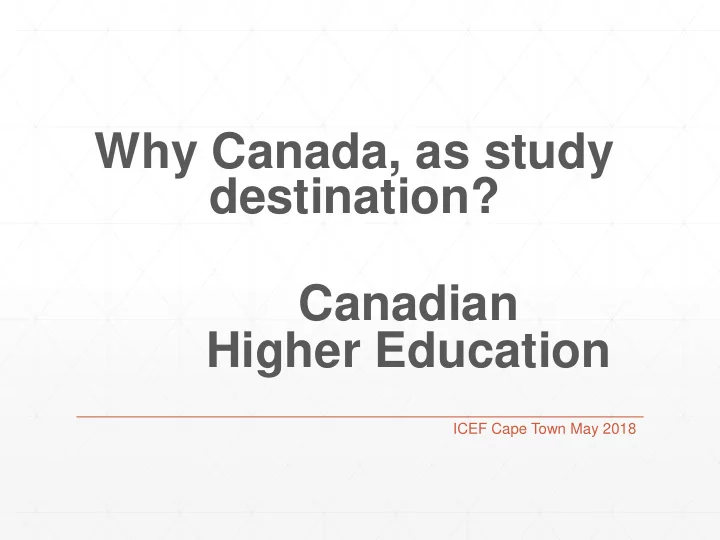

Why Canada, as study destination? Canadian Higher Education ICEF Cape Town May 2018
Jacobo Munoz Lantero Business Development Manager Africa, Europe & Turkey Seneca College Toronto, CANADA Jacobo.munoz-lantero@senecacollege.ca #SenecaInternational #brasileirosnoseneca #senecadestino
Canada Diversity
How to effectively promote Canada. Second largest country in the world. 35 million people. Welcoming environment 10 provinces. Top UN Ranking. Quality education Multicultural: 1 in 6 is a Abundant choice new immigrant. Officially bilingual (English Opportunity to succeed and French) but over 200 languages are spoken. 6.7% Unemployment. Source: census
Canadians and Education (Some variance by province/ territory) Secondary School Colleges, Institutes, Universities Cégeps, & Polytechnics University Colleges Apprenticeship Academic Upgrading (if required) 4-year BACHELOR’s DEGREE * * Workplace Indenturing University Transfer 1-2 year * Program 1st Year CERTIFITES In-class component at (1st& 2nd year) Colleges or Union 2nd Year Training Centres 4-year APPLIED and BACHELOR’s 3rd Year Joint 2-3 year DEGREE Degrees DIPLOMAS 4th Year MASTER’s DEGREE GRADUATE (1-2 years) DIPLOMAS (1 - 2 YEARS) DOCTORAL DEGREE (2-5 years) * Articulation & Transfers – all directions Source: CICAN
Strengths & Benefits ▪ Strength in academic offerings – Curriculum guided by and developed with Industry ▪ Strength in applied research – Opportunities to participate in hands- on research ▪ Strength in industry connections – close links to industry through co-op terms and work placements ▪ Benefits in small class sizes and more one-on-one instruction time ▪ Benefits in developing critical thinking and analytical skills, as well as hands-on training in the newest technologies Source: CICAN
96% of Seneca programs have a work-integrated learning experience Co-op Field Placement Practicums & Internships Study Abroad Seneca MILE program Career Services HELIX entrepreneur incubator
Direct from Industry Recognized & Award-winning Marketing professor Social Media professor BOB CARROLL BHUPESH SHAH Went from managing the Ranked one of the top Marketing department at Marketing professors on a top 5 bank to teaching Twitter and one of the 50 in Seneca’s School of business professors you Marketing should follow on Twitter Senior Sports York Regional Police CLIFF AGUILAR ANGELA JAMES Co-ordinator at Seneca (YRP) Central Intelligence Analyst and Police First woman to be inducted Foundations professor into the Hockey Hall of Fame Won the Leo McArthur Civilian Recognition Award for his dedication to the YRP and for his work in supporting equal treatment of the LGTBQ community Passionate Professors Therapeutic Recreation Fashion Arts professor PEIVAND PIROUZI ZORAN DOBRIC professor Toronto-based Canadian Went from working in the fashion designer and biopharmaceutical industry student mentor to the classrooms at Seneca
Two and Three year Diploma • The mainstay of our offerings: two and three year diplomas to train technicians, technologists, mid-level managers and service providers • This is the level that is neglected in most countries, leading to systemic unemployment and lack of productivity • In Canada, we have 7-8 technicians and technologists for every engineer. In most other countries, it is the opposite. Too heavily focused on the university route Source: CICAN
Program Pathways Post Graduate Diplomas Bachelors 1 or 2 years 2 or 3 years 4 years • TRANSFER TO • POSTGRADUATE UNIVERSITY CERTIFICATE OR MASTERS STUDY AT THE COLLEGE • AFTER OBTAINING AFTER OBTAINING WORK PERMANENT EXPERIENCE RESIDENCY • IT IS IMPORTANT TO BE • SAVE HALF OF THE UPDATE IN YOU FIELD COST
Working During Your Studies As per Citizenship and Immigration Canada (CIC): - Full time students enrolled at a Designated Learning Institution (DLI) can work off-campus without a work permit; - Work up to 20 hours per week during regular academic sessions; - Work full-time during scheduled breaks, (winter and summer holidays). http://www.cic.gc.ca/english/study/work-offcampus.asp
Post-Graduation Work Opportunities As per Citizenship and Immigration Canada (CIC): - Graduates of full-time academic programs at a Designated Learning Institution (DLI) are eligible for a Post-Graduation Work Permit; - Issued for the length of the study program, up to a maximum of three years; - Study program must be a minimum of 8 months in length. http://www.cic.gc.ca/english/study/work-postgrad.asp
* Seneca College – average tuition fees approx.. $10,400(USD)
Investment pay back Average of 85% of our graduates obtain employment within 3 months of graduating. Average salary for a Graduate 40000$(CAD) – 55000$(CAD) Average tuition fees approx.. $10,400(USD) – 16,000$ (CAD). Source: CICAN
Working After Graduation Industry Partners
Thank you !! Jacobo.munoz-lantero@senecacollege.ca Jacobo Munoz Lantero #SenecaInternational #brasileirosnoseneca Business Development Manager #senecadestin
Recommend
More recommend